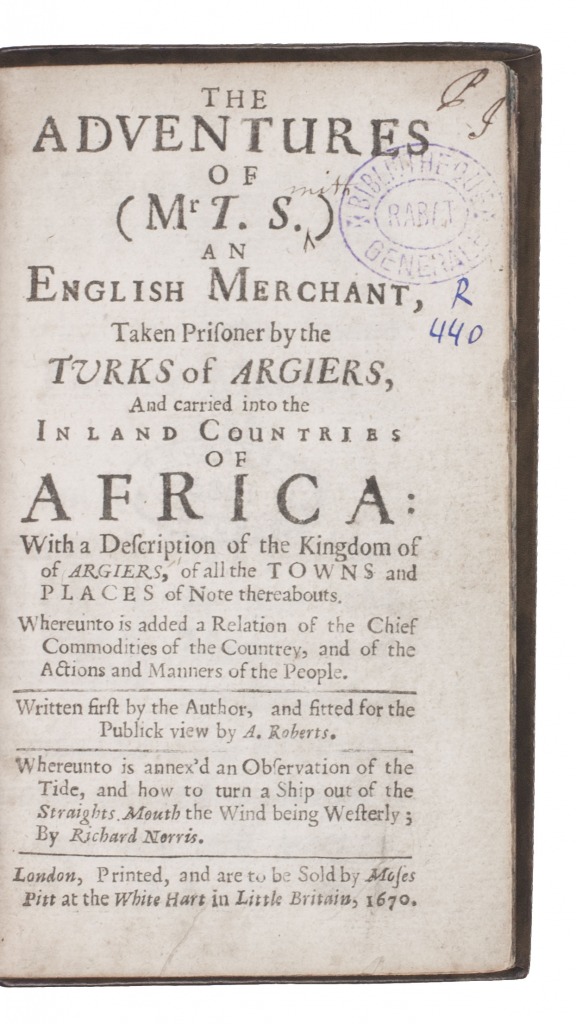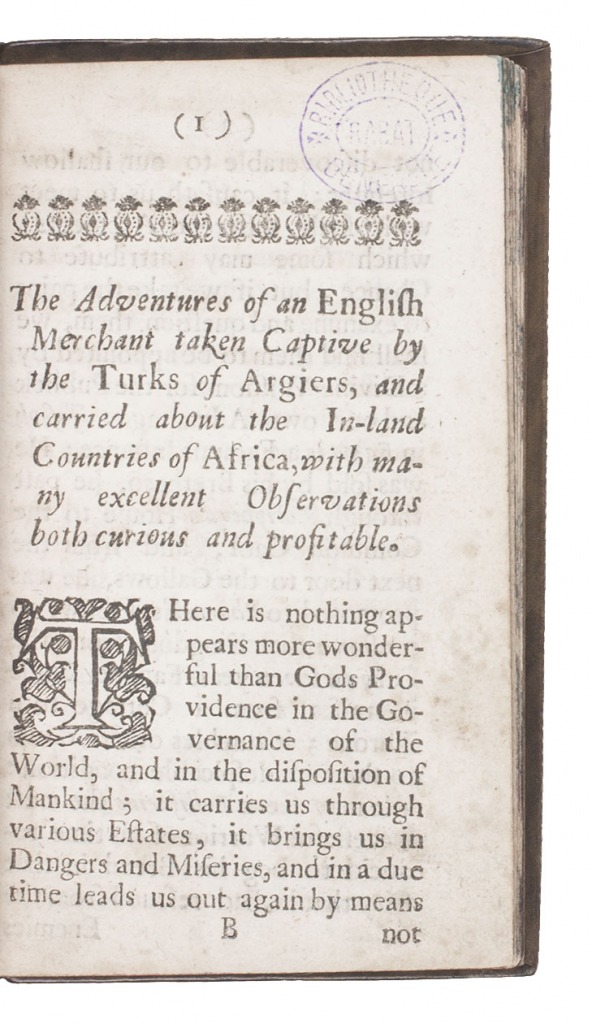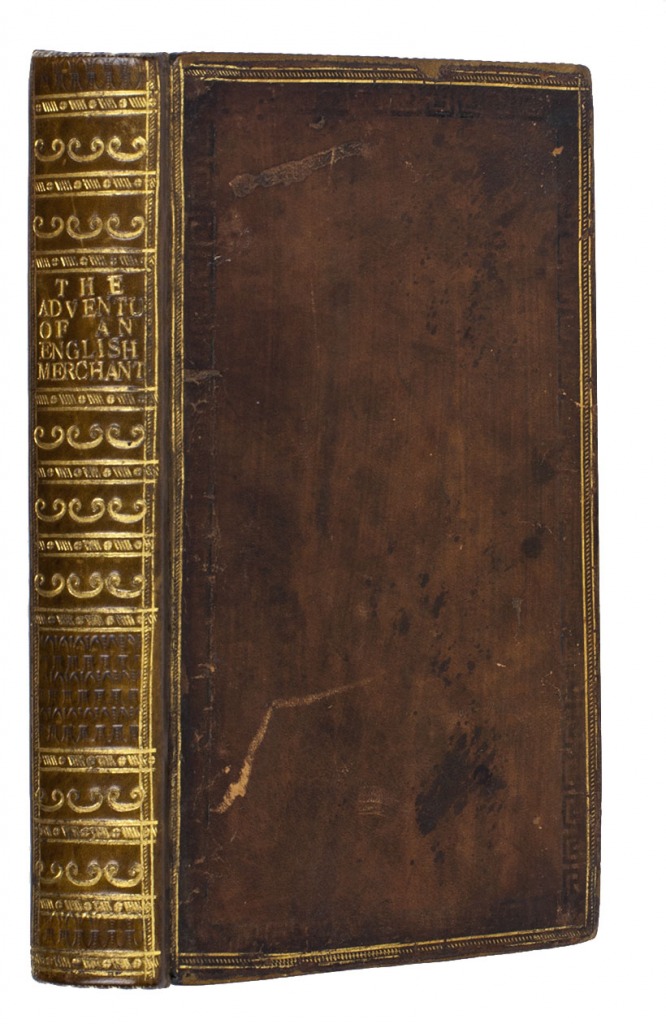ROBERTS, A.
The adventures of (Mr T. S.) an English merchant, taken prisoner by the Turks of Argiers, and carried into the inland countries of Africa: with a description of the kingdom of Argiers, of all the towns and places of note thereabouts. Whereunto is added a relation of the chief commodities of the countrey, and of the actions and manners of the people. Written first by the author, and fitted for the publick view by A. Roberts.
London, Moses Pitt [printed by William Wilson?], 1670. Small 8vo. With 2 decorated woodcut initials and decorative bands of cast fleurons. Blind- and gold-tooled calf (ca. 1800). [8], "252" [= 254], [2] pp.
€ 9,500
First edition of an extraordinary account of an English merchant mariner's capture by Barbary pirates in or soon after 1648 and his subsequent adventures as a slave in Algeria. It is presented as an authentic journal of T[homas?] S[mith?], posthumously prepared for the press by his friend A. Roberts and dedicated to their mutual friend "Thomas Manley esquire", probably the Middle Temple barrister of that name (1628-1690) who published on economic matters. The author tells us enough about his childhood and apprenticeship for us to estimate that he was born around 1627. He is certainly well-informed on the Ottomans in Africa and his story may be partly based on true events, but many of the details are clearly fantasy, with monstrous beasts and people turned to stone, in addition to tall tales of his own adventures. In the story he sets off from the Thames in the Hamburg merchant ship Sancta Maria in July 1648 and the ship is captured by Barbary pirates soon after. As a slave under numerous masters the author tricks his way into employment as cook to the King of Algiers, is then demoted to keeper of the King's bath and secretly fathers a daughter with one of the King's wives. After an unsuccessful stint as a gardener's assistant he journeys in the service of an Ottoman officer, collecting tribute money with the Algerian army, and offers his services as an advisor to the Ottoman governor of Tlemcen (northwest Algeria). He recounts observations on the various peoples encountered and their customs and peculiarities, marvelling at flying serpents, lions and ostriches and skirmishing with an army of Arabs. Against a backdrop of mosques, minarets and palaces, the narrative is peppered with anecdotes of meetings with Barbary pirates, European renegades, and dalliances with alluring women of the Maghreb. The author takes particular relish in recounting the details of his sexual adventures: "the women in this country keep much at home, but their minds and affections are more wandering abroad, because they are so recluse; whereas if they had as much liberty as in other countries they would not be so furiously debauch'd: their husbands keep strict guard over them, that when they can escape their eyes, they give the reins to their passion, and labour to satisfy themselves more abundantly; stolen waters are sweet: the more they are forbidden and hindered from variety, the more pleasure and satisfaction they fancy in it ... had my design been to make conquests in the Empire of Love, I think none could have been more happy ... this good opinion of my ability spread & increased wonderfully in the town ...". The author does not give the date that his master set him free as promised, but it cannot be earlier than 1650 and was likely later. He died before the 1670 publication. The present copy has the author's initial S filled out as "Smith" in an early hand, but he has not been identified.
This is one of four journeys undertaken by Englishmen in the Ottoman Mediterranean analysed recently by Gerald Maclean in his 2004 study, The rise of Oriental travel: English visitors to the Ottoman Empire, 1580-1720. It is of value both as a travel narrative and as a proto-novel reflecting the European fascination with the Orient. Howgego does not record it either among the genuine or the ficticious voyages.
An appendix by Richard Norris offers directions for navigating the Barbary coast. The last leaf of the final quire is a 2-page advertisement by the bookseller Moses Pitt, listing about twenty British and continental books from 1624 to works "now in the press".
With an early owner's initials PJ on the title-page, an 1820 manuscript bookplate of Henry White in Lichfield, England (along with a second label with an illustration and quotation from Ship of fools), a small ink stamp of Bibliotheque Generale, Rabat, Morocco, on the title-page and 4 other leaves, and a small ink owner's stamp of Alexander Gardyne, dated 1883. In good condition, very slightly browned and with a small chip at the head of two leaves, affecting only the page numbers. First edition of an English merchant's marvellous adventures in Ottoman Africa. Cox I, p. 362; Playfair, Algeria 155; Playfair, Morocco 244; Pforzheimer library 846; Wing S152; not in Atabey; Blackmer; Howgego.
Related Subjects:


